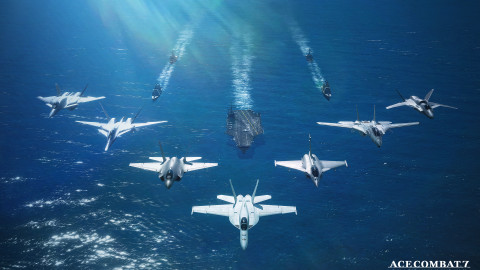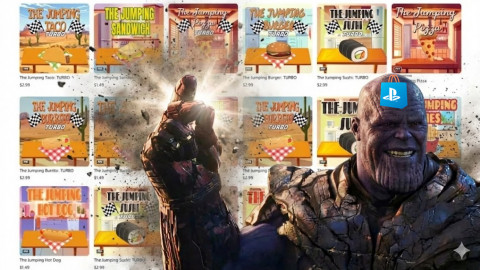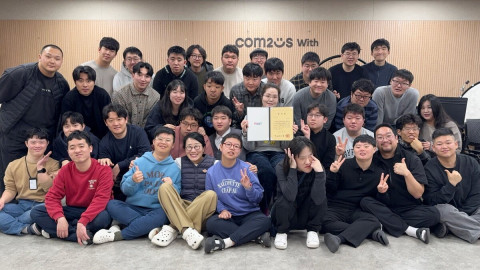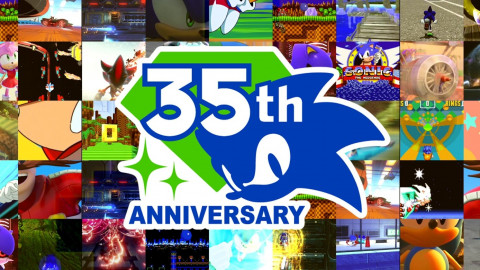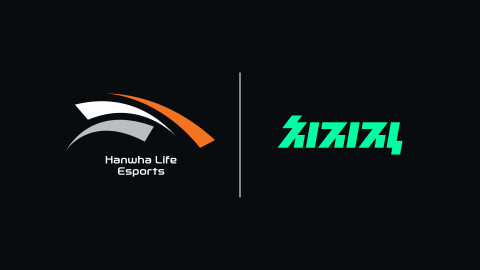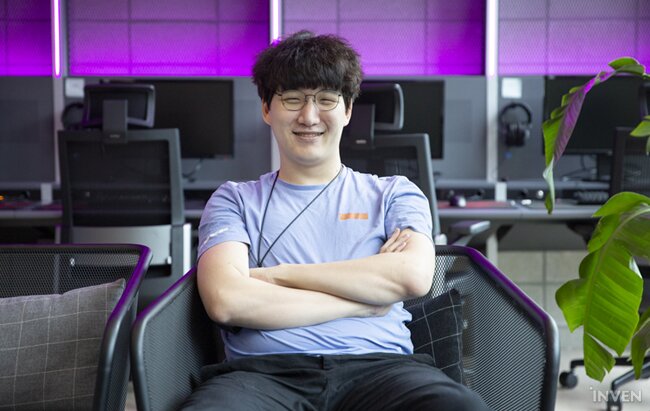
The fantastic performances from pro players are the heart and soul of LoL esports. But in a hectic game like League of Legends, stand out plays have the danger of going unnoticed, so how do the viewers always get the most hyped broadcast?
To make this happen, there are the so-called “observers”, who play an essential role in the scene. These people capture the moments on the screen so that the fans around the world can enjoy the best players compete. They can be considered the cameramen of traditional sports if those cameramen also had to make the real-time decisions of program directors.
Last week, we went behind the scenes to meet perhaps the most known member of the observers’ caste. Meet Lee “Jonnastrong” Jin-sae, the main observer of the LCK.
Please introduce yourself briefly.
Hello, I’m the main observer of the LCK, Lee “Jonnastrong” Jin-sae.
Should we start with some light questions? Could you explain about the rumor that you always vote for the bot laners for the POG? [laughs]
I think it was when Senna and poking Varus first appeared when that was first mentioned. I played Senna a LOT back then and my win rate was about 80%. That probably made me concentrate on Senna’s plays more and it could have affected my vote. Even if Senna plays well, it’s not that visible.
Other than that, I seldom gave the bot laner my vote. I counted the votes after the spring split and it turned out that I gave the second least votes to bot laners. [laughs] I’m pickier about the bot laners’ plays since I’ve been playing only bot for about eight years. You tend to see your own lane the most and it’s remembered the most.
Your nickname is also quite unique. Where did it come from? [“Jonna” is slang for “very” — Ed.]
Before I played LoL, I played Starcraft, and it was then when I first made my nickname. You know, no one bothered with their nicknames back then. [laughs] I saw someone else use something similar and I thought it was funny, so I followed that person. Later on, I took part in a tournament hosted by NiceGameTV. Since it was slang and not suitable for broadcast, they weakened the pronunciation.
You’ve been working as an observer for a very long time. We heard that it’s your seventh year. How did you first become an observer?
I started playing LoL after I completed my military service. I even tried out to become pro, but whenever I did, I got extremely nervous. So I assumed that being a pro gamer isn’t my path. One day, I went on a program called “Private Lesson”. They suggested that I should fill in to be an observer since one of them was leaving. I was lucky.
Since I’ve loved gaming since I was very young, I really wanted to work in the game industry. I loved watching esports as well, so I went to watch the LCK on-stage too. I took the offer since I thought I would be able to watch the plays of the pros the way I want to.

How did you first start gaming?
When I was a kid, I used to play circus games and racing games on a console. I really got into gaming was when I was about 10 years old when I started Starcraft. I played Fortress too. During middle school, I went to PC bangs a lot and was scolded because I played hooky in academy classes. [laughs]
Could you tell us how you got to join the LCK as an observer?
Before I worked as an LCK observer, I was the observer of Challengers Korea. That tournament went to AfreecaTV, so I had nowhere to go. I moved to the production team and did many things, even become a team lead. But the problem was that my original intention when I joined the company was that I wanted to be an observer of professional competitions.
So I told the company that I want to work as an LCK observer. It was when one of the producers I worked with went to SPOTV Games for the LCK. I even called him up and asked him if he needed an observer.
Anyways, I thought of quitting since it wouldn’t be appropriate to work in a different company while being an observer, but the company held on to me. They were considerate of me working as an LCK observer while working in the company.
That’s how I first became an observer. When the LCK production was going over to Riot Games, I heard that I would be moving together. One of the staff members gave me a hint. I was really happy that I would be covering the LCK fully.
We heard that observers are divided by main and sub. How do you divide your roles?
There are three people that work with me. One is in charge of replays, highlights, so he edits the videos. The sub observer helps out with the live feed requests and sometimes helps out with the replays as well.
In LoL Park, the production room and observer room is divided with a wall, so we use an interphone. But when I’m observing, I have to use both hands so sometimes it’s difficult to communicate. In those situations, the sub observer is like a messenger. The main observer’s role is basically what the fans know. Most of the compositions fans see on stream are controlled by me.
Some people refer to observers as game directors. Do you think it’s a proper expression for your work?
I don’t mind what others call me, but in broadcast production, a director is a very high position, so I like it. [laughs] If you ask me if it represents what observers do, I would say yes. An observer is like a cameraman plus director, which is literally what I do during the broadcasts.
You would be extremely busy during broadcasts.
That’s true. I have to listen to the comments from the casters, communicate with the sub observer, and watch the screen at the same time. When there are situations happening simultaneously, I tell the sub observer to let me know what’s happening right away. If it’s an urgent situation, I sometimes check the sub observer’s screen myself. The replay timing has to be decided with the production room as well.
When we add captions, play replays, or broadcast the POVs, the production room usually suggests how to do it. Then I look at the situation to decide when to play the clip depending on the length of the replay or how long to play the POVs. Since we have to use the interphone, sometimes the communication isn’t that fluent. From time to time, there are urgent situations where big fights occur while we’re playing a replay. In those situations, having to use the interphone is quite unfortunate.
But come to think of it, even if we were to use the same room, there would be problems. I need to listen to the casters, so I have the volume very loud. I’m very talkative while observing as well. In long matches, where the players don’t fight and just gather CS, we just chat casually, as if we’re watching from home.
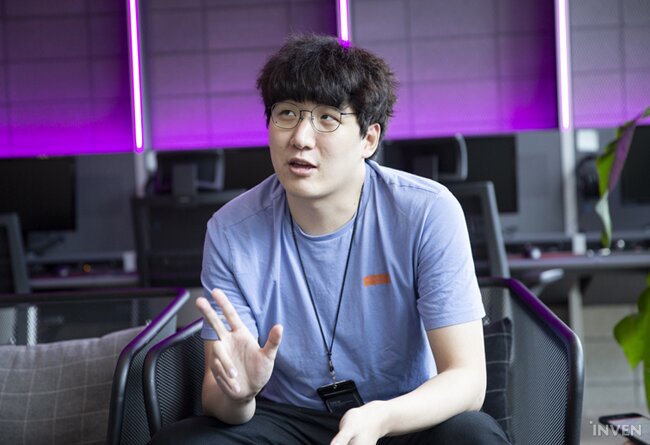
You said that if players intend to do something, you try to get everything on the screen starting from the planning. Can you elaborate?
I watch so many games that I see the general macro or the roaming habits of the players. For example, if a mid laner tries to push in the lane quickly to roam, I try to shoot from when the mid laner is pushing in the lane. And then, I show the top lane making a big wave for a dive. Then it goes to the mid laner heading towards top lane.
I try to make it easy for the viewers to understand the macro, one process at a time. That makes it easier for the casters to explain what’s happening and the fans could understand better.
The zoom-out function is usually used when the casters talk about the vision situation before a big objective fight. Also, there are often fights going on in two places during teamfights, so that is sometimes captured by the zoom-out function as well. The zoom-in function is usually used to emphasize something, like when Orianna uses her ult during a teamfight. It’s also used when some players taunt opponents using emojis or play the game with a popular skin.
How far and how close do the zoom in and out functions work?
It’s unlimited. You can zoom out so that the Summoner’s Rift becomes as small as a seed, or zoom in so that one grass stem fills the whole screen. Obviously, if it’s zoomed out too much, it doesn’t look that good, and if zoomed in too much, the screen turns inside out. You go through below the ground.
How do you manage the situation where fights go on in two places too far apart to get in one screen even with the zoom-out function?
In that case, the area where something started first becomes the main screen. For example, if there are situations in both top and bottom lanes, and someone died in the bot lane. Usually, the situation is over at that point.
That’s when we switch to the top lane. If it’s worth watching, we keep showing the top lane or else, we move the screen to someplace else. Sometimes we go chronologically. If there’s no time to move the camera, we use picture in picture. There’s no specific standard. It’s mostly improvising. The sub observer helps a lot as well.
Were there any situations where you got frustrated while observing?
More than simultaneous situations, I tend to get frustrated when nothing happens. Usually, I just watch the lanes that I want to watch. Mostly, it’s the bot lane. Not because I’m a bot laner, [laughs] it’s because the bot lane is usually 2v2, so trades happen more often. Damage supports appear more in the recent meta too.

How do you communicate with the casters?
I try to reflect what the casters say while listening to them. I turn the screen to where they want to see as fast as I can. If they want to check something, I turn the screen there as well.
Sometimes, I emphasize some items, runes, or summoner spells being used with the mouse cursor. The casters don’t always mention what I show, but it’s not only for the casters. I’m letting the viewers know as well.
What tier are the observers in?
When there weren’t Master or Grandmaster tiers, I was Diamond 1. Compared to now, it would be around Grand Master or Challenger, right? Now I’m Diamond 3. I wasn’t able to go higher than that. The other two observers are similar to me.
Even if there are games almost every day, I try to play as much as I can. That way, I can see the players’ go for a kill or predict what would happen next.
Do you think the LoL tier is related to observing?
I don’t think the tier is that important. Some players reach a high tier through their mechanics only and without any understanding of the game. For example, some people try to win by just hitting their enemy laner 24/7. If the opponent jungler comes along, they die. Those people sometimes have worse comprehension of the game than lower-tier players. It’s a playstyle that would never work in pro play. In that case, the high tier isn’t any help to being an observer.
Understanding how pro games go is more important and, more than anything, concentration is essential. The observers have to watch the minimap more than the main screen. In my case, I could see what’s happening or predict what would happen by just looking at the minimap. That’s something impossible to do those who are in a high tier but have zero comprehension of the game.
What would be the three most important things as an observer?
The main priority is to have the viewers not feel any inconvenience. You shouldn’t change the screen rapidly as if you’re watching the game alone or flash the status bar. Since you’re controlling it, you’d know it’s coming, but the viewers aren’t ready so they would get uncomfortable and dizzy.
It’s also important to help out the casters as much as you can. They comment through the screen the observer captures. It’s best if you can show the casters what they ask for as soon as possible. The third would be trying to get as many good performances of players on video.
There are observers in the foreign leagues too. What are the differences?
Well, it would all be quite similar. The LPL used to show a lot of highlights, and LCK is doing so too. It seemed that the LEC had a unique way of showing replays and they use a small screen often when teleport is used, capturing the champion that used it. That’s harder than it looks. It’s not technically difficult, but you need quick reaction and concentration.
Do you have any interesting stories while working as an observer?
I remember when I made a mistake. It was during the MSC, a match between T1 and FunPlus Phoenix. T1 won a teamfight, and as much as it’s like a national match, I was relieved, so I had a sip of coffee. When I was putting down the coffee, I pressed ESC by mistake and that went out. I almost panicked.
I sometimes go to amateur competitions as well. When I do, I try to get the moments where the players could take to remember that moment. Once, I gathered the highlights of a certain player who did well and made a replay of them playing. They came up to me after the competition and thanked me. I felt really good about that. The streamers that played in Inven’s competition also thanked me for catching their super plays.
If there are no limits, what would you like to add to the observing technology?
I want to have the champions that have stacks appear automatically. You know, there are many champions that have a stack system, like Nasus, Veigar, or Senna. The stacks are important for those champions. It would be good if the items’ cooldown time appear like the summoner spell cooldowns too. Notifying when a champion maxes a skill would be good so that the viewers can see more conveniently about which player masters which skill first.
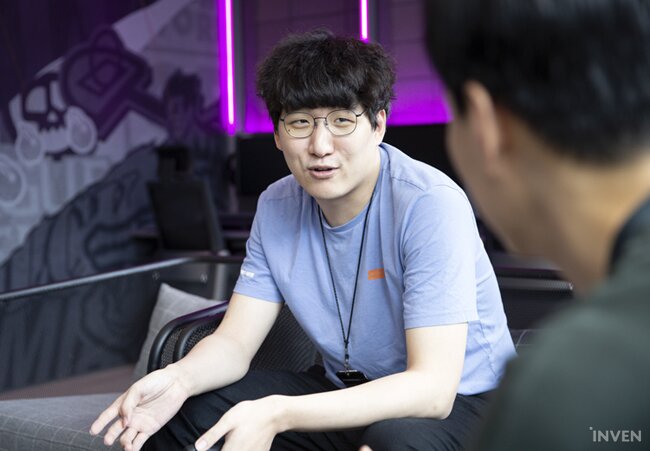
Is there something new you’re attempting or have attempted while observing recently?
I try several things and look out for the reactions of the viewers. If they don’t like it, I don’t do it the next time. If they like it, I try to use whatever it is often.
One of the things I’ve been doing is like kind of becoming the “god of vision”. I turn off one team’s vision on purpose, so that the skills look like they’re coming out of nowhere. Once, I attempted to turn the screen in live play, but the terrain blocked the view. I don’t do that often anymore.
It’s been a long time since you’ve been doing this. Is it still fun and interesting for you?
Since I’m a person who really loves gaming, it’s really fun. I’ll probably have fun until I get sick of LoL. It’s tiring when I get to work, but when I arrive, time flies.
There aren’t that many people who dream to be an observer, so it might be easier to start. You don’t need a specific expertise or degree either. There aren’t that many chances, but I often get a call asking if there are any people that can be an observer for a certain event. If you really love gaming and you want to work in the gaming industry, I could say that being an observer is alright.
The esports industry will grow more, and there will be more observers. What observers do would become more important as well. Any words to those who hope to become an observer one day?
First, I’d like to say, if you don’t really love gaming, you shouldn’t do it. When those people do the observing, it really shows that you don’t love gaming. There are difficulties as well. If you’re observing a game where nothing really happens, it gets loose and tiring. I try to work standing up in those situations so that I wouldn’t lose my concentration. It’s like standing in the back of the classroom to not doze off. If you don’t love gaming, it’s going to be a lot harder.
Also, you have to watch the games as if you’re studying, until you can foretell the near future when you see a situation. If you just watch the screen as the game goes, you’ll miss important moments. That’s not good observing. You need to watch a lot and study constantly. If you’re able to do that, you can become a great observer.
-

A managing editor who can do more things than you think.
-

-

Sort by:
Comments :0


